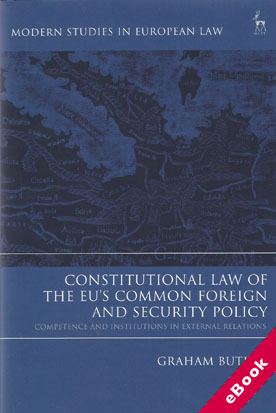
The device(s) you use to access the eBook content must be authorized with an Adobe ID before you download the product otherwise it will fail to register correctly.
For further information see https://www.wildy.com/ebook-formats
Once the order is confirmed an automated e-mail will be sent to you to allow you to download the eBook.
All eBooks are supplied firm sale and cannot be returned. If you believe there is a fault with your eBook then contact us on ebooks@wildy.com and we will help in resolving the issue. This does not affect your statutory rights.
The Common Foreign and Security Policy (CFSP) of the European Union is a highly exceptional component of the EU legal order. This constitutionalised foreign policy regime, with legal, diplomatic, and political DNA woven throughout its fabric, is a distinct sub-system of law on the outer-most sphere of European supranationalism. When contrasted against other Union policies, it is immediately clear that EU foreign policy has a special decision-making mechanism, making it highly exceptional.
In the now depillarised framework of the EU treaties, issues of institutional division arise from the legacy of the former pillar system. This is due to the reality that of prime concern in EU external relations is the question of ‘who decides?’ By engaging a number of legal themes, cutting across foreign affairs exceptionalism, executive prerogatives, parliamentary accountability, judicial review, and the constitutionalisation of European integration; the book lays bare how EU foreign affairs has become highly legalised, leading to ever-greater coherence in how Europe exerts itself on the global stage.
In this first monograph dedicated exclusively to the law of the EU’s Common Foreign and Security Policy in modern times, the book argues that the legal framework for EU foreign affairs must adapt in a changing world as to ensure the EU treaties can cater for a more assertive Europe in the wider world.